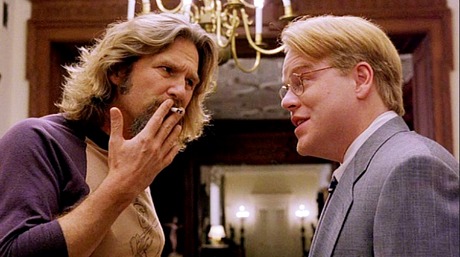The Hollywood Reporter‘s Scott Feinberg has posted about La La Land‘s likely home court advantage in terms of Oscar noms and awards. Feinberg wrote this article as a kind of thumbs-up, back-pat gesture to Team La La, but it actually implies that Damian Chazelle‘s well-admired musical is a bit of a banality. Which I don’t feel is true — I’m saying that Feinberg’s piece kinda suggests this.


Feinberg’s supposition is that residents of Los Angeles (i.e., where most Academy and guild members live) “get” La La Land as a familiar tale happening on home turf, and that as long as a movie in question presents a mostly positive, upbeat, alpha-vibey representation of Los Angeles and movie culture in particular (as La La Land does), the odds favor a win or two.
But the very finest Los Angeles-set films, of course, have never been alpha-vibey. They’ve all been about crime, smog, corruption, fallen angels, moral ambiguity and existential drift.
A few of the best in this realm are John Boorman‘s Point Blank, Robert Altman‘s The Long Goodbye, Robert Aldrich‘s Kiss Me Deadly and The Big Knife, Joel and Ethan Coen‘s The Big Lebowski, Frank Perry‘s Play It As It Lays, Martin Ritt‘s No Down Payment, Howard Hawks‘ The Big Sleep, Billy Wilder‘s Double Indemnity, Paul Thomas Anderson‘s Boogie Nights and Magnolia, Richard Fleischer‘s The New Centurions, Joel Schumacher‘s Falling Down, William Wellman and George Cukor‘s versions of A Star Is Born and John Schlesinger‘s The Day of the Locust. Others?
Feinberg mentions a few downbeat but highly regarded L.A-set films that received no Best Picture nominations — Easy Rider (drug dealing), The Player (glib concepts, shallow manipulations, an impulsive murder of a screenwriter), Mulholland Drive (dreamscape horrors, mental afllictions, hot lezzy sex scene), Training Day (LAPD corruption), Nightcrawler (cutthroat video paparazzi) and Straight Outta Compton (racial tensions).
He also mentions a few that “earned nominations but not arguably well-deserved wins” — The Graduate (illicit affair, “plastics”, young love), Chinatown (extravagant 1930s corruption — the fix is in), Pulp Fiction (glib crime, violence-as-fashion) and L.A. Confidential (LAPD corruption in the ’50s). In fact Quentin Tarantino and Roger Avary won an Oscar for Best Original Screenplay, and the fact that Mike Nichols won a Best Director Oscar for The Graduate was an obvious indication that Best Picture support was considerable.
Positive L.A. portraiture: Crash (Angelenos grappling with racial biases but conveying a sense of struggle and counter-balance), The Artist (film industry types overcoming the arrival of talkies) and Argo (movie guys helping U.S. government types pull off a dception that will free hostages).
The best “Los Angeles film” ever made? One that doesn’t so much cherry-pick from an assortment of Los Angeles maladies as consider the entire cultural, multi-racial sprawl of it, past and present? Thom Andersen‘s Los Angeles Plays Itself, which is where the title of this article comes from.












